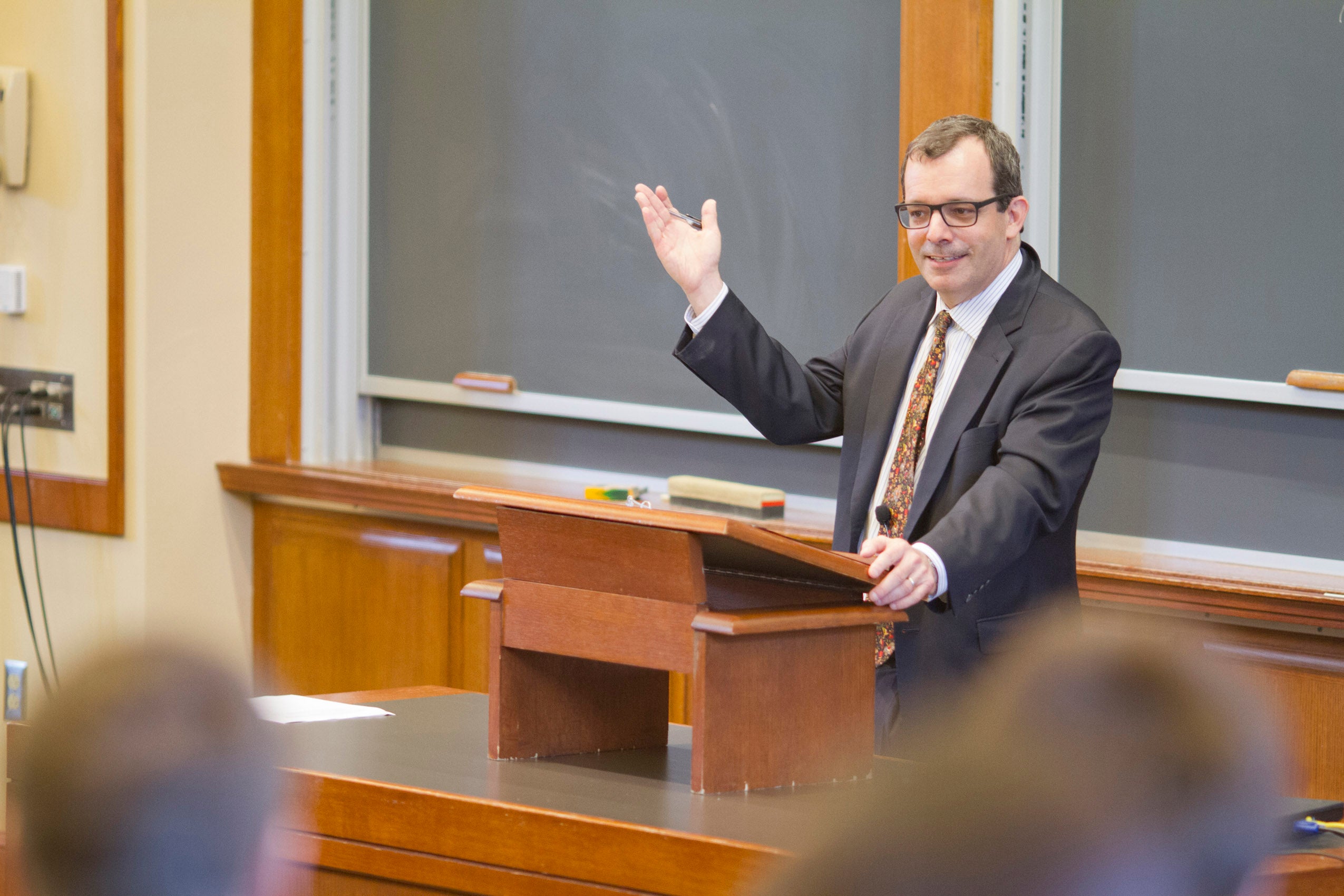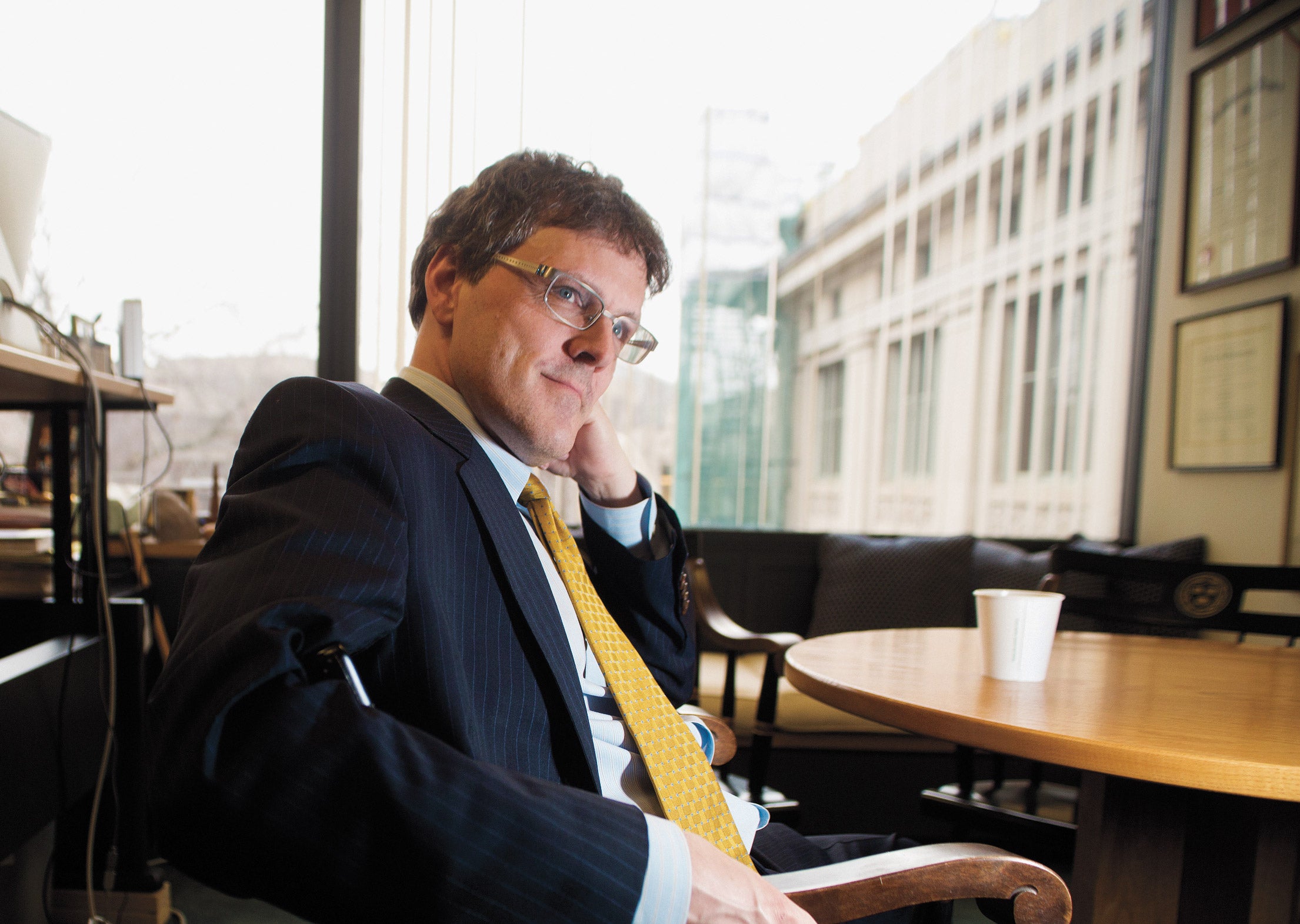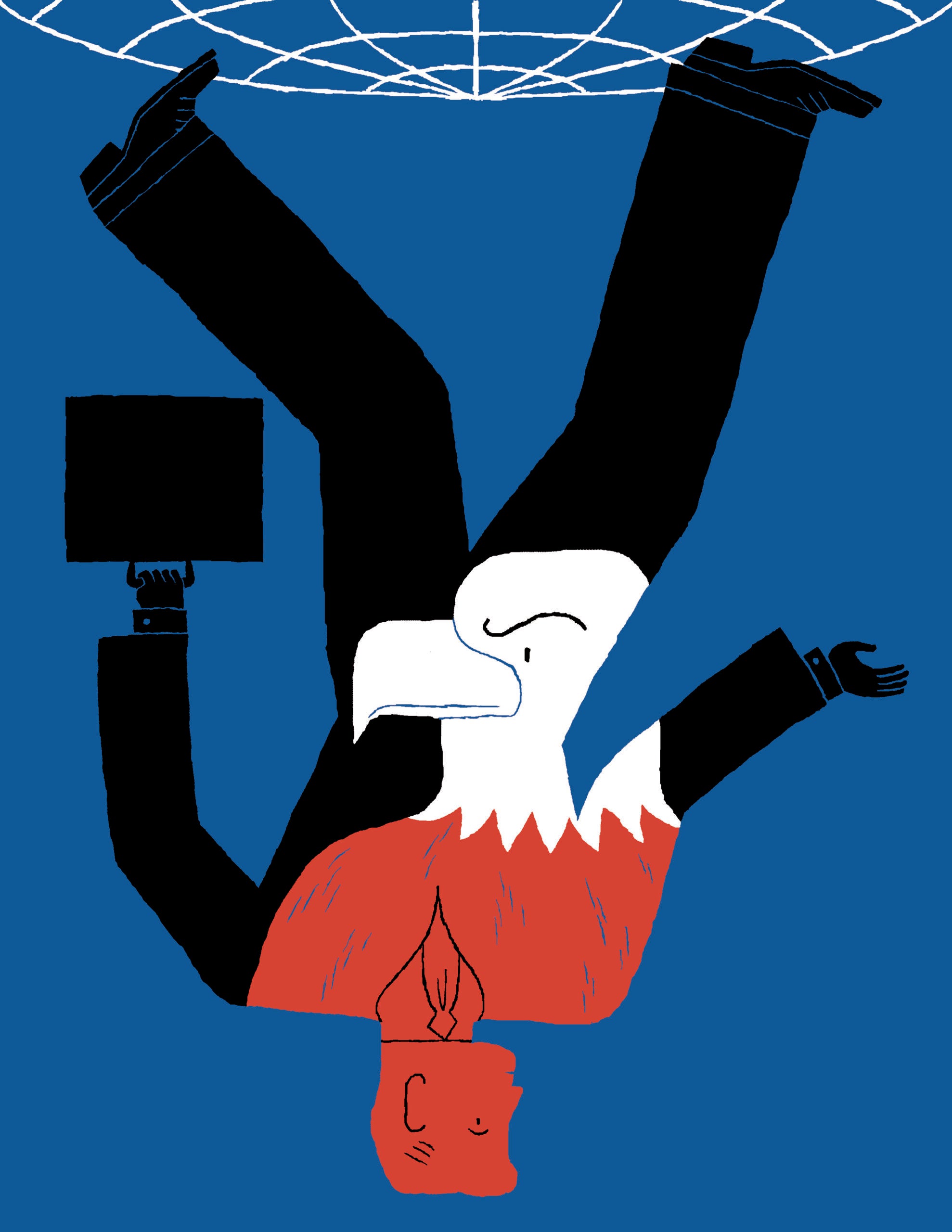People
John Coates
-
Delamaide: Hasty law can’t stop SEC rule on political disclosure
January 3, 2016
A bit of last-minute skullduggery in Congress blocking efforts to make companies disclose political contributions may fall short of its goal. Buried in the 2,000 pages of the $1.1 trillion spending bill passed into law this month was one of those nasty little riders that has nothing to do with funding the government but are slipped into a must-pass bill at the last minute...The legal opinion written by Harvard Law Professor John Coates argues that this wording does not in the meantime restrict the preparatory tasks of issuing a rule — internal discussion, planning, investigation, analysis, evaluation and development of possible proposals. "These steps often take years and consume significant agency funds and other resources," Coates wrote in his Dec. 17 opinion.
-
The U.S. Securities and Exchange Commission is free to continue planning rules requiring corporate disclosure of political spending despite passage of Republican-backed budget language prohibiting the agency from using 2016 dollars to finalize, issue or implement such a policy, a Harvard scholar's Tuesday legal opinion says. The opinion, offered by Harvard Law School professor John C. Coates IV, differentiates between planning for such a rule and finalizing, issuing or implementing it.
-
Labor union dissenters influence political speech more than shareholders: law profs to SCOTUS
November 10, 2015
Scathing commentary about the U.S. Supreme Court’s 2010 decision in Citizens United v. Federal Election Commission has tended to focus on the court’s refusal to restrict corporate political spending. As you know, the justices struck down campaign finance reforms as an unconstitutional violation of corporations’ free speech rights, triggering an avalanche of predictions that corporate donors would wield outsized political influence. The other free speech beneficiaries of Citizens United – labor unions also subject to the invalidated campaign finance restrictions – haven’t been the subject of nearly as much fear and loathing. That’s going to change, at least a little, later this term when the Supreme Court hears Friedrichs v. California Teachers Association...The point of the amicus brief, according to law professor John Coates of Harvard, was to highlight the relative rights of union beneficiaries and shareholders, particularly because in this case, the justices are being asked to give non-union members even more control over political expenditures they don’t support. “It seemed like a good opportunity to intervene – even better than a corporate case,” said Coates, who said he wrote the initial draft of the brief and circulated it to likely co-signers. He said he was pleasantly surprised that so many corporate law professors – 19 in all – ended up joining a brief in a case that nominally has nothing to do with corporate law. (Among the amici are Lucian Bebchuk of Harvard...)
-
Verizon’s Twisted Plan to Censor Your Internet
October 30, 2015
Earlier this year, the Newseum Institute asked 1,000 Americans to name their rights under the First Amendment. A clear majority listed freedom of speech first -- before freedom of religion, assembly, and other core civil liberties. And that makes sense. Protecting free speech is essential to the health of any functioning democracy...We owe this Orwellian shift in thinking to a growing number of court decisions, among them Citizens United, that define corporations as people and their business practices as speech. Harvard Law School's John C. Coates documented this change in a study released last February, noting that "corporations have begun to displace individuals as the direct beneficiaries of the First Amendment." This trend, Coates writes, isn't just "bad law and bad politics." It's also "increasingly bad for business and society."
-
AB InBev, SABMiller Race to Finish as Takeover Rules Force Hand
September 16, 2015
The world’s largest brewer wanted to keep the biggest deal of the year under wraps. Market chatter and the U.K.’s unique takeover rules got in the way. The Takeover Panel forced SABMiller Plc to release a statement about an approach from larger rival Anheuser-Busch InBev NV after speculation on Tuesday sent London-based SABMiller’s shares up as much as 4.1 percent, according to two people with knowledge of the matter, who asked not to be identified because the information is private...“Media attention following disclosure of deal negotiations can be disruptive to the companies, and can kill an otherwise valuable deal” said John Coates, professor of law and economics at Harvard University.
-
Corporations Are Perverting the Notion of Free Speech
August 5, 2015
An op-ed by John Coates and Ron Fein. Corporations are taking over the First Amendment. That’s not new, but it’s accelerating—and we have the data to prove it. Many people are familiar with the Supreme Court’s 2010 Citizens United decision, which held that corporations have a First Amendment right to spend unlimited amounts of money to influence elections. But the problem goes beyond election spending. Just one year after Citizens United, in a less widely reported decision, the court struck down a Vermont confidentiality law that prohibited sale of drug prescription data for marketing purposes. As the court explained, the law limited the “speech” of pharmacies and data miners that sell this data for use by pharmaceutical sales representatives.
-
The Israeli pharmaceutical company Teva was quick to cut its losses yesterday after U.S. Magistrate Judge Lisa Lenihan of Pittsburgh recommended a preliminary injunction barring Kirkland & Ellis from continuing to advise Teva in its hostile bid for Mylan, an occasional Kirkland client since 2013. Kirkland announced that it will file an objection to Judge Lenihan’s recommendation, which will be reviewed by U.S. Chief District Judge Joy Conti, but in the meantime, Teva hired Sullivan & Cromwell to replace the firm in the Mylan takeover battle....In an expert report for Mylan that Judge Lenihan ultimately considered very persuasive, Harvard Law professor John Coates argued that virtually all previous litigation could be considered related to an unsolicited bid because so many factors shape the hostile takeover process.
-
On Thursday, April 23, Bruce Bromley Professor of Law John Manning ’85 capped off a four-part series of “Last Lectures” for the Harvard Law School Class of 2015 with a list of eight simple rules students should live by if they wish to be both “happy lawyers and human beings.”
-
Will Corporate ‘Speech’ Undermine Productivity?
May 4, 2015
John Coates argues that extending speech protections to corporations is bad—not just for democracy but for capitalism.
-
Old-fashioned virtues
April 16, 2015
Everything about Berry Bros. and Rudd's showroom in St James’s Street, London, suggests tradition. The walls are panelled in dark oak. Leather-bound volumes record “the weights of customers of this establishment” from 1765 onwards, sitting alongside a set of weights from a time when the shop sold coffee rather than alcohol. Simon Berry represents the 7th generation of Berrys to run the company, and he looks the part. ... John Coates and Reiner Kraakman, of Harvard Law School, who studied the tenure of CEOs in the Standard & Poor’s 500 in 1992-2004, found that those who held more than 1% of the stock (which includes family firms) were at the helm for an average of 13.4 years, compared with 5.5 years for other companies.
-
Law School Appoints Title IX Committee
April 2, 2015
Dean of Harvard Law School Martha L. Minow has appointed a Title IX committee to begin implementing the school’s new set of procedures for responding to cases of alleged sexual harassment, according to Law School spokesperson Robb London...After a group of 28 professors published an open letter in the Boston Globe that criticized Harvard’s policy in October, Minow appointed a committee, chaired by Law School professor John Coates, to draft a new set of school-specific procedures.
-
How Corporations Took Over the First Amendment
April 2, 2015
When the D.C. Circuit Court of Appeals ruled that POM Wonderful was overstating pomegranate juice's health benefits in its advertisements, a press release from the FTC, which was challenging POM in court, called the decision “a victory for consumers.” The Wall Street Journal agreed, describing it as “a notable win.” In a sense, it was: The company was banned from trumpeting its juice as an elixir that could help prevent heart disease, prostate cancer, and erectile dysfunction if there wasn't sufficient research done to back up those claims. But in another sense, the decision wasn’t a victory at all. Buried in the FTC’s press release was the reluctant acknowledgement that the Circuit Court denied the FTC the ability to require that POM base its advertising on at least two randomized, well-controlled clinical trials... To arrive at this decision, the Court wasn’t relying on some obscure bit of corporate law; it was relying on the First Amendment. How problematic is it that a company selling at least $100 million worth of juice every year based on sketchy empiricism could defend its preposterous advertising claims in court on free-speech grounds, and still be humored? That’s one question that John Coates, a professor at Harvard Law School and a former corporate lawyer, explores in a recent survey of what he calls “the corporate takeover of the First Amendment.” According to Coates, companies are now the beneficiaries of cases involving the First Amendment just as often as individuals, and the frequency of those cases has been rising since the mid-70s.
-
Why Corporations Learned To Love Free Speech (video)
April 1, 2015
A recent study claims that "corporations have begun to displace individuals as direct beneficiaries of the First Amendment." Its author [John Coates] joins HuffPost Live to discuss his findings and explain what they mean for free speech.
-
Liberals used to love the First Amendment. But that was in an era when courts used it mostly to protect powerless people like civil rights activists and war protesters. These days, a provocative new study says, there has been a “corporate takeover of the First Amendment.” The assertion is backed by data, and it comes from an unlikely source: John C. Coates IV, who teaches business law at Harvard and used to be a partner at Wachtell, Lipton, Rosen & Katz, the prominent corporate law firm. “Corporations have begun to displace individuals as the direct beneficiaries of the First Amendment,” Professor Coates wrote. The trend, he added, is “recent but accelerating.” Professor Coates’s study was only partly concerned with the Supreme Court’s recent decisions amplifying the role of money in politics. “It’s not just Citizens United,” he said in an interview, referring to the 2010 decision that allowed unlimited independent spending by corporations in elections. His study, he said, analyzed First Amendment challenges from businesses to an array of economic regulations...In a recent essay, Laurence H. Tribe, a law professor at Harvard, offered a cautious partial defense of the Citizens United decision. But he said it was an instance of a larger phenomenon. “It is part of a trend in First Amendment law that is transforming that body of doctrine into a charter of largely untrammeled libertarianism,” he wrote, “in which the regulation of virtually all forms of speech and all kinds of speakers is treated with the same heavy dose of judicial skepticism, with exceptions perversely calculated to expose particularly vulnerable and valuable sorts of expression to unconvincingly justified suppression.”
-
An article by John C. Coates, Jesse M. Fried, and Kathryn E. Spier. An online survey of 124 practicing attorneys at major law firms suggests possible new directions for educating and training Harvard Law School students. The most salient result from the survey is that students should learn accounting and financial statement analysis, as well as corporate finance. These two subject areas are viewed as particularly valuable both for lawyers in litigation and lawyers working in corporate/transactional practice areas.
-
When a faculty committee at Harvard Law School convened to craft a new set of sexual harassment procedures for the school last fall, they examined existing processes at peer institutions, according to Law professor John Coates, who chaired the committee. The final product of their work closely resembles systems in place at other schools across the Ivy League, particularly Columbia. The Law School’s new Title IX procedures, which break from Harvard’s central process for adjudicating sexual harassment complaints filed against students, were adopted by the Law faculty in December and will be soon implemented, according to administrators.
-
In Memo, Law Profs Pushed for Title IX Procedural Changes
February 13, 2015
Twenty Harvard Law School professors who had publicly spoken out against Harvard’s University-wide sexual harassment policy submitted a memo last fall requesting that the Law School investigate its own sexual harassment cases, rather than go through Harvard’s central investigation office...The document, parts of which signatory and Law School professor Elizabeth Bartholet shared with The Crimson this week, sheds light on the process that led to the adoption of the local procedures that, if implemented, in many respects will circumvent Harvard’s newly centralized approach to handling sexual misconduct...Law School professor John Coates, who chaired the committee that wrote the school’s new procedures, confirmed in an email that the committee considered the memo’s principles when it drafted the procedures.
-
Law Students Leave Torts Behind (for a Bit) and Tackle Accounting
February 13, 2015
A group of 170 Brooklyn Law School students cut short their winter break and headed back to campus in January for an intensive three-day training session. But not in the law. Instead, they spent the “boot camp” sessions learning about accounting principles, reading financial statements, valuing assets and other basics of the business world — subjects that not long ago were thought to have no place in classic law school education...Last year, Cornell University Law School started a similar business-focused workshop, called “Business Concepts for Lawyers.” The idea came from a Harvard Law School survey of employers released in February 2014, said Lynn A. Stout, a professor of corporate and business law at Cornell. The 124 firms that responded to the survey, called “What Courses Should Law Students Take? Harvard’s Largest Employers Weigh In,” listed accounting, financial statement analysis and corporate finance as the best courses to prepare lawyers to handle corporate and other business matters.
-
Thirteen Harvard Law School faculty listed among SSRN’s 100 most-cited law school professors
January 29, 2015
Statistics released by the Social Science Research Network (SSRN) indicate that, as of the end of 2014, Harvard Law School faculty members featured prominently on SSRN’s list of the 100 most-cited law professors.
-
Tax Turnaround Time?
November 24, 2014
Proposals for reversing the corporate inversion trend bring home the need for tax reform.
-
Figuring Out if a Financial Institution Is Too Big to Fail
November 17, 2014
The insurance company MetLife is unhappy that it has been added to the list of firms that get special attention from regulators for being too big, or too interconnected, to fail. It appears to want to fight the designation by arguing that the government has not provided the numbers supporting its analysis, and that this failure to do the math makes the designation unreasonable, and, therefore, illegal....In short, the government did not use math to defend its designation. Should it be required to do so? Cass Sunstein, President Obama’s first regulatory czar and now a law professor at Harvard, has said he believes that agencies should make the quantitative case whenever possible. Another Harvard Law professor, John Coates, on the other hand, argues that the assumptions involved in assessing the costs and benefits of financial regulation look too much like ever-changing guesstimates.


